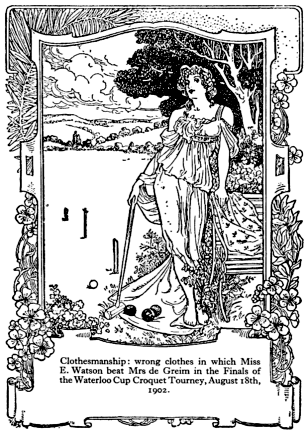
|
Excerpts fromLifemanshipStephen Potter |
GAMESMANSHIP AND WOMEN
THE WHOLE question of Women and Gamesmanship thrusts into the very roots of the science. There is scarcely a gambit which cannot be used, provided the basic adaptation is made, by women against men, and vice-versa.
Let us begin these brief notes with an example of one such gambit. For some readers the names ‘Charles and Christabel’ may strike a chord. These two remarkably tall, handsome lawn-tennis players frankly disliked each other in private life (there was some affair between them which went wrong). But for years they worked together most effectively as co-gamesters.
Procedure: Charles begins his singles match at the local club. A man’s stiff singles. To start with, he plays purposely below his form. Then, with the score 4–1 against him, say, in the first set, by a prearranged signal Christabel would appear, to watch. Her appearance blindingly smart, she makes a big entry, in the character of ‘Charles’s girl, come to back him up.’ Charles would immediately begin to drive and serve with more Zonk – would really get going, and if he could manage to win an ace service, Christabel would give him a smile of dazzling encouragement.
Charles’s opponent turns gloomy. ‘Oh God,’ he thinks. ‘He’s going to play up to this girl.’ Christabel, of course, takes not the slightest notice of this opponent.
The effect of this attack is redoubled, of course, if Charles’s opponent has as his spectator some plain and dowdy niece or aunt, who looks stuffily indifferent to what is going on. O. Bousfield, however, had a brilliant counter to this. Bousfield’s spectator-friend, Miss Grace Perry, was a girl of stupefying plainness: but when Charles’s Christabel came on the scene, with smiles of ravished and ravishing admiration, Bousfield pretended suddenly to feel himself under no obligation to conceal his own idiotic ‘devotion’ to the frightful-looking girl, Miss Perry. He sent her a thousand glances, even blew her a few surreptitious kisses, and played at her all the time. Poor Charles, as we all remember, completely lost his game in a daze of bewildered and futile curiosity.
For women, it is now accepted that knowledge of Clothesmanship is all-important: and a good deal of useful putting-off can be achieved by a clever use of better clothes.

Finally, what is the essential strategy of sex war in games? For the man who finds himself playing against a woman, in singles or mixed, a good working knowledge of the Chivalry Gambit is essential.
In lawn-tennis singles, he will begin perhaps by saying, ‘The male is allowed this one prerogative, I hope. Do please take choice of side and service.’ If this does not have the desired effect of flustering the girl into making the man a present of the first game as she attempts to serve against the sun, it will yet start the average woman off on the wrong foot.
At golf, little attentions, such as picking up the woman’s golf-bag for her, will have the same effect, especially if on the one occasion when the woman really wants help with her clubs (scrambling up a steep hill) this little attention is forgotten.
In lawn-tennis mixed, the basic chivalry move is to pretend to serve less fiercely to the woman than the man. This is particularly useful if your first service tends to be out in any case.
And what is the woman’s counter to the chivalry gambit? Remember, in general don’t react against the chivalry move. Appear to be hoodwinked by it – and if your male opponent shows the least signs of trying the ‘I have long adored you from afar’ move, treat it immediately as a formal proposal of marriage which you shyly accept. This is one of the most devastating, the most match-winning, counters in the whole realm of gamesmanship.
Stephen Potter, Lifemanship, 1950